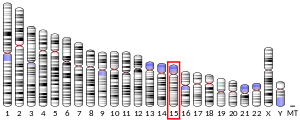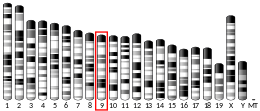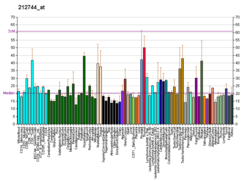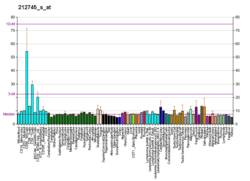BBS4
Bardet–Biedl syndrome 4 is a protein that in humans is encoded by the BBS4 gene.[5][6][7]
This gene encodes a protein which contains tetratricopeptide repeats (TPR), similar to O-linked N-acetylglucosamine transferase. Mutations in this gene have been observed in patients with Bardet–Biedl syndrome type 4. The encoded protein may play a role in pigmentary retinopathy, obesity, polydactyly, renal malformation and mental retardation.[7]
References
- GRCh38: Ensembl release 89: ENSG00000140463 - Ensembl, May 2017
- GRCm38: Ensembl release 89: ENSMUSG00000025235 - Ensembl, May 2017
- "Human PubMed Reference:". National Center for Biotechnology Information, U.S. National Library of Medicine.
- "Mouse PubMed Reference:". National Center for Biotechnology Information, U.S. National Library of Medicine.
- Carmi R, Rokhlina T, Kwitek-Black AE, Elbedour K, Nishimura D, Stone EM, Sheffield VC (Jan 1995). "Use of a DNA pooling strategy to identify a human obesity syndrome locus on chromosome 15". Human Molecular Genetics. 4 (1): 9–13. doi:10.1093/hmg/4.1.9. PMID 7711739.
- Mykytyn K, Braun T, Carmi R, Haider NB, Searby CC, Shastri M, Beck G, Wright AF, Iannaccone A, Elbedour K, Riise R, Baldi A, Raas-Rothschild A, Gorman SW, Duhl DM, Jacobson SG, Casavant T, Stone EM, Sheffield VC (Jun 2001). "Identification of the gene that, when mutated, causes the human obesity syndrome BBS4". Nature Genetics. 28 (2): 188–91. doi:10.1038/88925. PMID 11381270.
- "Entrez Gene: BBS4 Bardet-Biedl syndrome 4".
- Kim JC, Badano JL, Sibold S, Esmail MA, Hill J, Hoskins BE, Leitch CC, Venner K, Ansley SJ, Ross AJ, Leroux MR, Katsanis N, Beales PL (May 2004). "The Bardet-Biedl protein BBS4 targets cargo to the pericentriolar region and is required for microtubule anchoring and cell cycle progression". Nature Genetics. 36 (5): 462–70. doi:10.1038/ng1352. PMID 15107855.
Further reading
- Haftek J, Krawczykowa Z, Stankiewicz A, Araszkiewicz H, Goś R, Kasprzak H (Jun 1975). "[Ocular manifestations in orbital fractures]". Klinika Oczna. 45 (6): 655–9. PMID 1138127.
- Bruford EA, Riise R, Teague PW, Porter K, Thomson KL, Moore AT, Jay M, Warburg M, Schinzel A, Tommerup N, Tornqvist K, Rosenberg T, Patton M, Mansfield DC, Wright AF (Apr 1997). "Linkage mapping in 29 Bardet-Biedl syndrome families confirms loci in chromosomal regions 11q13, 15q22.3-q23, and 16q21". Genomics. 41 (1): 93–9. doi:10.1006/geno.1997.4613. PMID 9126487.
- Katsanis N, Eichers ER, Ansley SJ, Lewis RA, Kayserili H, Hoskins BE, Scambler PJ, Beales PL, Lupski JR (Jul 2002). "BBS4 is a minor contributor to Bardet-Biedl syndrome and may also participate in triallelic inheritance". American Journal of Human Genetics. 71 (1): 22–9. doi:10.1086/341031. PMC 384990. PMID 12016587.
- Riise R, Tornqvist K, Wright AF, Mykytyn K, Sheffield VC (Oct 2002). "The phenotype in Norwegian patients with Bardet-Biedl syndrome with mutations in the BBS4 gene". Archives of Ophthalmology. 120 (10): 1364–7. doi:10.1001/archopht.120.10.1364. PMID 12365916.
- Hoskins BE, Thorn A, Scambler PJ, Beales PL (Aug 2003). "Evaluation of multiplex capillary heteroduplex analysis: a rapid and sensitive mutation screening technique". Human Mutation. 22 (2): 151–7. doi:10.1002/humu.10241. PMID 12872256. Check date values in:
|year= / |date= mismatch(help) - Kim JC, Badano JL, Sibold S, Esmail MA, Hill J, Hoskins BE, Leitch CC, Venner K, Ansley SJ, Ross AJ, Leroux MR, Katsanis N, Beales PL (May 2004). "The Bardet-Biedl protein BBS4 targets cargo to the pericentriolar region and is required for microtubule anchoring and cell cycle progression". Nature Genetics. 36 (5): 462–70. doi:10.1038/ng1352. PMID 15107855.
- Ye X, Dai J, Fang W, Jin W, Guo Y, Song J, Ji C, Gu S, Xie Y, Mao Y (Jun 2004). "Cloning and characterization of a splice variant of human Bardet-Biedl syndrome 4 gene (BBS4)". DNA Sequence. 15 (3): 213–8. doi:10.1080/10425170410001679165. PMID 15497446. Check date values in:
|year= / |date= mismatch(help) - Rual JF, Venkatesan K, Hao T, Hirozane-Kishikawa T, Dricot A, Li N, Berriz GF, Gibbons FD, Dreze M, Ayivi-Guedehoussou N, Klitgord N, Simon C, Boxem M, Milstein S, Rosenberg J, Goldberg DS, Zhang LV, Wong SL, Franklin G, Li S, Albala JS, Lim J, Fraughton C, Llamosas E, Cevik S, Bex C, Lamesch P, Sikorski RS, Vandenhaute J, Zoghbi HY, Smolyar A, Bosak S, Sequerra R, Doucette-Stamm L, Cusick ME, Hill DE, Roth FP, Vidal M (Oct 2005). "Towards a proteome-scale map of the human protein-protein interaction network". Nature. 437 (7062): 1173–8. doi:10.1038/nature04209. PMID 16189514.
External links
- GeneReviews/NIH/NCBI/UW entry on Bardet-Biedl Syndrome
- Human BBS4 genome location and BBS4 gene details page in the UCSC Genome Browser.
This article is issued from Wikipedia. The text is licensed under Creative Commons - Attribution - Sharealike. Additional terms may apply for the media files.





